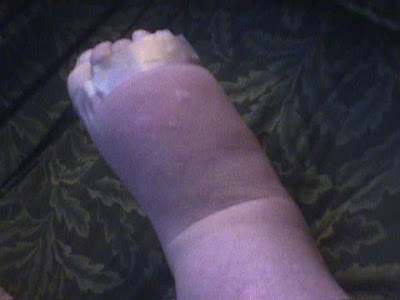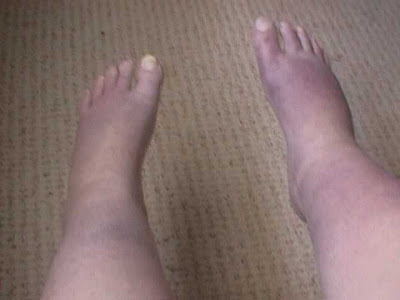Without disclosing what exactly made me think of it, I spent a good quarter of an hour this afternoon extolling the merits of Frost's poem Mending Wall. We were on the way home from my two medical appointments, and stuck in nasty traffic behind tentative drivers, all of whom, according to Fred, represented the fruits of the bastardization of our species. Or something like that.
I had a captive audience, is what I'm saying.
In a vain effort to keep me from endless nattering, he switched on NPR. At some point after the story on Clinton's meeting with our "chief Asian allies," shortly after the report on the televised arguments before California Supreme Court on Prop 8, but before the bit on the Random Hacks of Kindness Hackathon, I managed to reproduce the poem in its entirety. You might call it A Blurt.
Mending WallPersonally, I found my outburst not just appealingly literary but also perspicaciously germane.
SOMETHING there is that doesn't love a wall,
That sends the frozen-ground-swell under it,
And spills the upper boulders in the sun;
And makes gaps even two can pass abreast.
The work of hunters is another thing:
I have come after them and made repair
Where they have left not one stone on stone,
But they would have the rabbit out of hiding,
To please the yelping dogs. The gaps I mean,
No one has seen them made or heard them made,
But at spring mending-time we find them there.
I let my neighbor know beyond the hill;
And on a day we meet to walk the line
And set the wall between us once again.
We keep the wall between us as we go.
To each the boulders that have fallen to each.
And some are loaves and some so nearly balls
We have to use a spell to make them balance:
"Stay where you are until our backs are turned!"
We wear our fingers rough with handling them.
Oh, just another kind of outdoor game,
One on a side. It comes to little more:
He is all pine and I am apple-orchard.
My apple trees will never get across
And eat the cones under his pines, I tell him.
He only says, "Good fences make good neighbors."
Spring is the mischief in me, and I wonder
If I could put a notion in his head:
"Why do they make good neighbors? Isn't it
Where there are cows? But here there are no cows.
Before I built a wall I'd ask to know
What I was walling in or walling out,
And to whom I was like to give offence.
Something there is that doesn't love a wall,
That wants it down!" I could say "Elves" to him,
But it's not elves exactly, and I'd rather
He said it for himself. I see him there,
Bringing a stone grasped firmly by the top
In each hand, like an old-stone savage armed.
He moves in darkness as it seems to me,
Not of woods only and the shade of trees.
He will not go behind his father's saying,
And he likes having thought of it so well
He says again, "Good fences make good neighbors."
Okay, so I didn't reproduce the poem perfectly, all of a piece. Maybe I paraphrased a little and transformed larger passages into morcels of personal opinion -- but largely? Largely, it was there.
It was enormously beneficial that Fred was very familiar with Mending Wall, and, of course, fairly familiar with my belief that poetry is as important as politics, and often times is as much -- or more -- of an event.
Did I align myself as pro-community, against isolationism? Did I declare my make-up to be all pine in a world of hardwood fruit trees? Do I hate walls but believe in the neighborly act of gathering to repair the divider?
Maybe the wall has value only as a point of broken-down and crumbling old references, as what is familiar, and therefore dear, no matter whether proven true, disproved, or established as patently irrelevant.
It's where we gather; It's where we start.
Why not end with a story, a true one, both germane and tangential? When I was browsing, reading about walls [[[I am weird that way... a poem about mending walls requires at least some time thinking about actual walls {always remember: "imaginary gardens with real toads..."}]]] -- Anyway, I came across this at a site called Texas Escapes which sometimes features columns by Mike Cox, and in this instance, one called Rock Fences. He particularlizes one of the German immigrants who authored the many rock fences of Texas Hill Country, the "backyard of Austin and San Antonio," and one is reminded, even more, what a rich expressive vehicle a wall can be:
Louis Grosz, born in Hueffenhardt, Germany in 1853, came to Texas when he was 18. His uncle, Phillipp Eckert of Mason County, had written and told him what tools he needed to bring to make a living in America. Grosz weighed his two trunks down with iron, including a broad axe needed to build a log cabin.
As Estella Hartmann Orrison related in a family history she self-published in 1957, “Eckert Record,” when Grosz finally reached the Hill Country he had to go to work to repay the $50 his uncle had advanced him for his passage to Texas. His first income came from laying rock fences at 50 cents a day in an era when no one had yet considered working only eight hours out of 24.
Likely toiling from “can see to can’t,” Grosz’ rate of compensation amounted to only pennies on the hour. And the work must have been brutally hard. Roy Bedichek, in his 1947 book “Adventures with a Texas Naturalist,” estimated the stone fences on his place in Hays County weighed “not less than a ton per linear yard.” The rule of thumb passed down to the present is that it took one man one day to build three feet of fence three feet high.
That three-feet-a-day pace involved not only the relatively mindless toil of finding, digging up, lifting and hauling suitable rocks but the more cerebral activity of sorting and stacking them just so. Gravity held these fences together, not mortar. The rocks had to fit snugly and be balanced.
Picture working a gigantic puzzle with very heavy pieces in a climate where most of the time it’s too hot and sometimes too wet or cold or both. Throw in a sore back and the occasional displaced scorpion or rattlesnake and you have a pretty tough way to make four bits a day. Oh, and hostile Indians still posed a danger in Mason County when Grosz had to earn money as a rock fence builder.
While rock fences also are known as “German fences,” research by University of Texas graduate Laura Knott, a landscape architect specializing in historic preservation revealed that dry-laid fences did not originate in Germany. Rather, the style used in Texas and elsewhere in the South seems to have been modeled after rock fences common to Great Britain.
Knott theorized that German Texans learned of the style and imitated it. On the other hand, it doesn’t take a rock-it scientist to figure that a potential farm field strewn with plow-breaking stones could be both fenced and cleared by stacking those very stones.
***** ***** ***** ***** ***** ***** ***** *****
THE BIT I WROTE AFTER REACHING THE POINT WHERE ONE IS SUPPOSED TO STOP WRITING AND WHICH MOST PEOPLE MANAGE TO EDIT AWAY also known as my usual after-post detritis:
Of course, the truly infuriating thing is that no matter how outnumbered are the Forces That Would Have A Wall, the mere existence of a single wall proponent is enough to necessitate a building project worthy of the Army Corps of Engineers. In much the same way that one must opt for the plural masculine form of the third person personal pronouns if a single masculine element is present in the subject pool, one wall-lover casts a broad shadow.
After all these years it still pisses me off -- that when 999 women openly gather, you just have to discover one guy in the coat closet to ruin The Sisterhood. You must represent the group as masculine plural; You must choose ils as subject pronoun.
And unless you can withstand the onslaught of Shrugs-for-Answers, you don't ask "Why?"
Laws of race, laws of gender, politics of sexual orientation, tax breaks for millionaires, warning shots across the bow, ideas of intellectual ownership, and walls. Walls. Yeah, my ride home was deep today!






